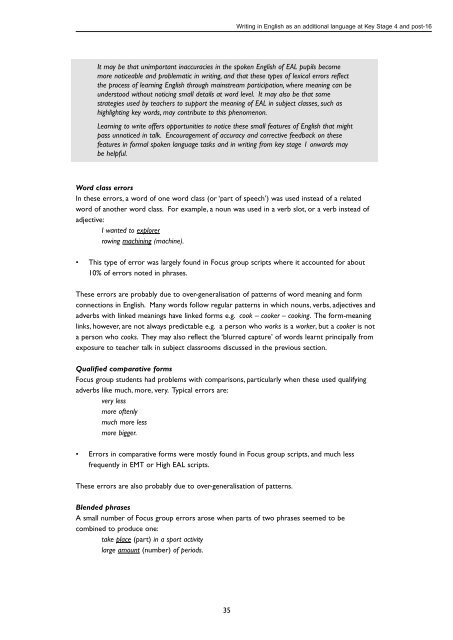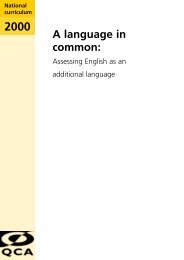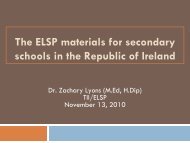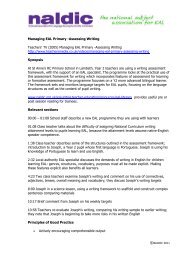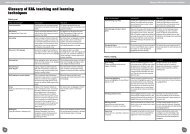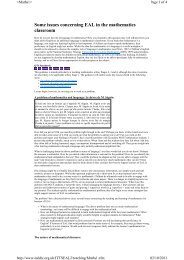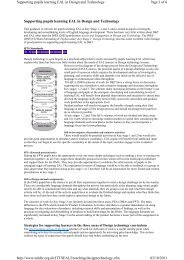Writing in English as an additional language at Key Stage 4 and ...
Writing in English as an additional language at Key Stage 4 and ...
Writing in English as an additional language at Key Stage 4 and ...
Create successful ePaper yourself
Turn your PDF publications into a flip-book with our unique Google optimized e-Paper software.
<strong>Writ<strong>in</strong>g</strong> <strong>in</strong> <strong>English</strong> <strong>as</strong> <strong>an</strong> <strong>additional</strong> l<strong>an</strong>guage <strong>at</strong> <strong>Key</strong> <strong>Stage</strong> 4 <strong>an</strong>d post-16It may be th<strong>at</strong> unimport<strong>an</strong>t <strong>in</strong>accuracies <strong>in</strong> the spoken <strong>English</strong> of EAL pupils becomemore noticeable <strong>an</strong>d problem<strong>at</strong>ic <strong>in</strong> writ<strong>in</strong>g, <strong>an</strong>d th<strong>at</strong> these types of lexical errors reflectthe process of learn<strong>in</strong>g <strong>English</strong> through ma<strong>in</strong>stream particip<strong>at</strong>ion, where me<strong>an</strong><strong>in</strong>g c<strong>an</strong> beunderstood without notic<strong>in</strong>g small details <strong>at</strong> word level. It may also be th<strong>at</strong> somestr<strong>at</strong>egies used by teachers to support the me<strong>an</strong><strong>in</strong>g of EAL <strong>in</strong> subject cl<strong>as</strong>ses, such <strong>as</strong>highlight<strong>in</strong>g key words, may contribute to this phenomenon.Learn<strong>in</strong>g to write offers opportunities to notice these small fe<strong>at</strong>ures of <strong>English</strong> th<strong>at</strong> mightp<strong>as</strong>s unnoticed <strong>in</strong> talk. Encouragement of accuracy <strong>an</strong>d corrective feedback on thesefe<strong>at</strong>ures <strong>in</strong> formal spoken l<strong>an</strong>guage t<strong>as</strong>ks <strong>an</strong>d <strong>in</strong> writ<strong>in</strong>g from key stage 1 onwards maybe helpful.Word cl<strong>as</strong>s errorsIn these errors, a word of one word cl<strong>as</strong>s (or ‘part of speech’) w<strong>as</strong> used <strong>in</strong>stead of a rel<strong>at</strong>edword of <strong>an</strong>other word cl<strong>as</strong>s. For example, a noun w<strong>as</strong> used <strong>in</strong> a verb slot, or a verb <strong>in</strong>stead ofadjective:I w<strong>an</strong>ted to explorerrow<strong>in</strong>g mach<strong>in</strong><strong>in</strong>g (mach<strong>in</strong>e).• This type of error w<strong>as</strong> largely found <strong>in</strong> Focus group scripts where it accounted for about10% of errors noted <strong>in</strong> phr<strong>as</strong>es.These errors are probably due to over-generalis<strong>at</strong>ion of p<strong>at</strong>terns of word me<strong>an</strong><strong>in</strong>g <strong>an</strong>d formconnections <strong>in</strong> <strong>English</strong>. M<strong>an</strong>y words follow regular p<strong>at</strong>terns <strong>in</strong> which nouns, verbs, adjectives <strong>an</strong>dadverbs with l<strong>in</strong>ked me<strong>an</strong><strong>in</strong>gs have l<strong>in</strong>ked forms e.g. cook – cooker – cook<strong>in</strong>g. The form-me<strong>an</strong><strong>in</strong>gl<strong>in</strong>ks, however, are not always predictable e.g. a person who works is a worker, but a cooker is nota person who cooks. They may also reflect the ‘blurred capture’ of words learnt pr<strong>in</strong>cipally fromexposure to teacher talk <strong>in</strong> subject cl<strong>as</strong>srooms discussed <strong>in</strong> the previous section.Qualified compar<strong>at</strong>ive formsFocus group students had problems with comparisons, particularly when these used qualify<strong>in</strong>gadverbs like much, more, very. Typical errors are:very lessmore oftenlymuch more lessmore bigger.• Errors <strong>in</strong> compar<strong>at</strong>ive forms were mostly found <strong>in</strong> Focus group scripts, <strong>an</strong>d much lessfrequently <strong>in</strong> EMT or High EAL scripts.These errors are also probably due to over-generalis<strong>at</strong>ion of p<strong>at</strong>terns.Blended phr<strong>as</strong>esA small number of Focus group errors arose when parts of two phr<strong>as</strong>es seemed to becomb<strong>in</strong>ed to produce one:take place (part) <strong>in</strong> a sport activitylarge amount (number) of periods.35


